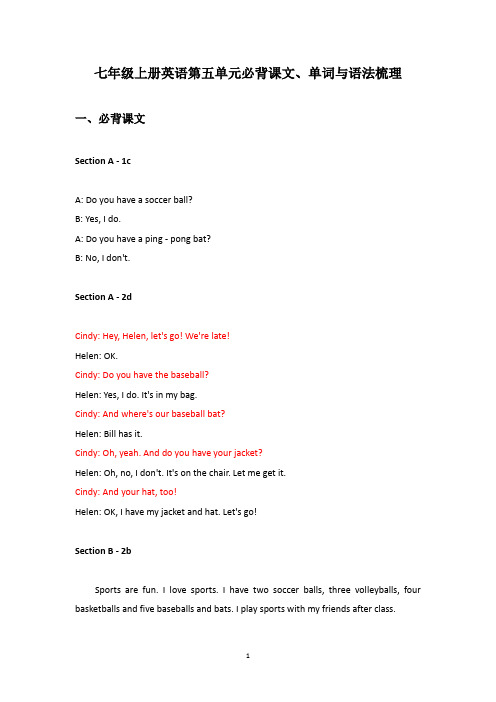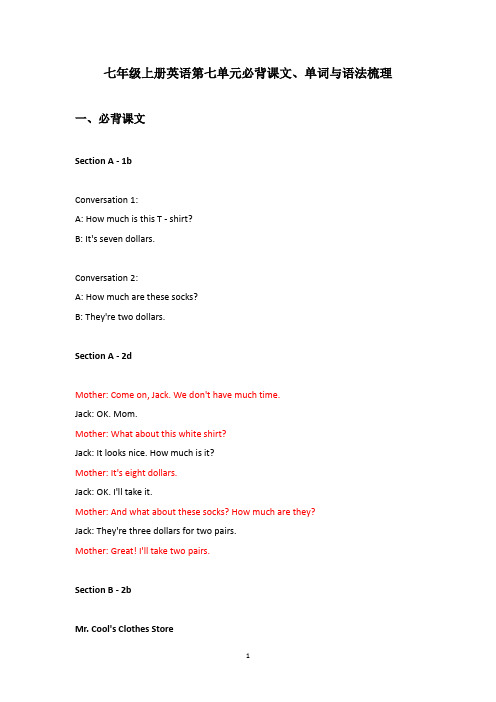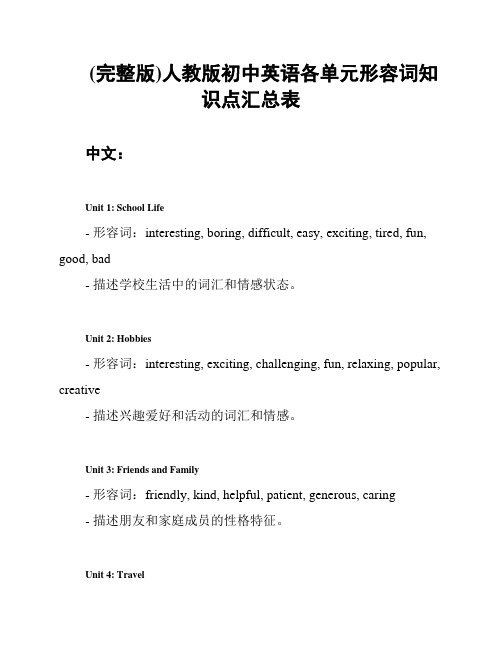人教版初中英语各单元语法知识点汇总表
人教版七年级(初中一年级)上册英语第五单元必背课文、单词与语法梳理汇总

七年级上册英语第五单元必背课文、单词与语法梳理一、必背课文Section A - 1cA: Do you have a soccer ball?B: Yes, I do.A: Do you have a ping - pong bat?B: No, I don't.Section A - 2dCindy: Hey, Helen, let's go! We're late!Helen: OK.Cindy: Do you have the baseball?Helen: Yes, I do. It's in my bag.Cindy: And where's our baseball bat?Helen: Bill has it.Cindy: Oh, yeah. And do you have your jacket?Helen: Oh, no, I don't. It's on the chair. Let me get it.Cindy: And your hat, too!Helen: OK, I have my jacket and hat. Let's go!Section B - 2bSports are fun. I love sports. I have two soccer balls, three volleyballs, four basketballs and five baseballs and bats. I play sports with my friends after class.I love sports, but I don't play them - I only watch them on TV! I like to watch soccer games. Soccer is difficult. I like ping - pong. It's easy for me. I have three ping -pong balls and two ping -pong bats. After class, I play ping -pong with my classmates.二、重点单词1. have:[hæv] v.(第三人称单数形式has)有;吃;喝;经受;经历2. soccer:[ˈsɒkə(r)] n. 足球3. ball:[bɔːl] n. 球;舞会4. soccer ball:足球5. tennis:[ˈtenɪs] n. 网球6. tennis ball:网球7. ping - pong:[ˈpɪŋ pɒŋ] n. 乒乓球8. volleyball:[ˈvɒlibɔːl] n. 排球9. basketball:[ˈbɑːskɪtbɔːl] n. 篮球10. do:[duː](第三人称单数形式does)aux. (用于构成否定句和疑问句等);v. 做;干;构成否定句、疑问句的助动词11. let:[let] v. 让12. us:[ʌs] pron.(宾格)我们13. let's = let us:让我们14. go:[ɡəʊ] v. 去;走;离开;变得;进行15. we:[wiː] pron. 我们(主格)16. late:[leɪt] adj. 迟到;晚的;adv. 晚;迟17. has:[hæz] v. (have的第三人称单数形式)有18. get:[ɡet] v. 去取(或带来);得到;收到;变成;购买;到达19. great:[ɡreɪt] adj. 美妙的;伟大的;很棒的;重大的20. play:[pleɪ] v. 参加(比赛或运动);玩耍;演奏;播放;n. 戏剧;剧本21. sound:[saʊnd] v. 听起来好像;发出声音;n. 声音;音响22. interesting:[ˈɪntrəstɪŋ] adj. 有趣的23. boring:[ˈbɔːrɪŋ] adj. 没趣的;令人厌烦的24. fun:[fʌn] adj. 有趣的;使人快乐的;愉快的;n. 乐趣;快乐;玩笑;娱乐活动25. difficult:[ˈdɪfɪkəlt] adj. 困难的;费力的;艰难的26. relaxing:[rɪˈlæksɪŋ] adj. 轻松的;令人放松的27. watch:[wɒtʃ] v. 观看;注视;看守;监视;n. 表;手表28. TV:[ˌtiː ˈviː] n. 电视;电视机(television的缩写)29. same:[seɪm] adj. 相同的;同一的;pron. (和……)同样的事物(或人)30. love:[lʌv] v. 爱;喜欢;n. 爱;热爱;慈爱;爱情31. with:[wɪð] prep. 和……在一起;带有;使用;以;由于32. sport:[spɔːt] n. 体育运动;(某项)体育运动;v. 炫耀;夸示33. them:[ðəm] pron.(宾格)他们;她们;它们三、语法知识点1. 一般现在时(have的用法)-have表示“有”的用法:have在一般现在时中,当主语是第一、二人称(I、you、we、you、they)以及复数名词时,用原形have,如:I have a book.(我有一本书。
人教版初中英语七年级上册全册各单元知识点、语法归纳整理

人教版初中英语七年级上册全册各单元知识点、语法归纳整理She’s my sister.她是我的妹妹。
3.This is a picture of my family.这是我家人的一张照片。
4.In the first photo。
there’s my XXX.在第一张照片里,有我的爷爷。
5.This is my family tree.这是我的家谱。
6.What’s the name of your father?你父亲叫什么名字?7.Have a good day!过得愉快!重点语法1.名词所有格2.复数形式3.人称代词宾格4.指示代词this和these的用法5.介绍人物时的基本用语:This is …/These are…1.指示代词:this。
that。
these。
those - 这个,那个,这些,那些2.名词复数规则:1)一般情况下直接加s。
2)以s,x,sh,ch结尾的加es。
3)以辅音字母加y结尾的将y变i再加es。
4)以o结尾的加s或es。
(有生命+es物生命加s)5)以f/fe结尾的名词,先将f/fv变成v再加es。
3.人称代词:I。
he。
she。
it和they - 我,他,她,它,他们/她们/它们4.重点短语:Is this/that your。
- 这/那是你的……吗?Yes。
it is。
/ No。
it isn't。
- 是的,是它。
/ 不,不是。
XXX。
- 这些/那些是我的……Here are。
- 这里有……This/That is my。
- 这/那是我的……Have a good day。
- 祝你玩得愉快!Excuse me for interrupting。
but could I ask you a n?Thank you very much.Could you please speak in English?Do you enjoy playing computer games?Have you checked in the lost and found case to see if your item is there?Please call 685-6034 to reach me.I lost my school ID card and need to find it.I need a set of pencils for my art class.Key XXX structures:Is that your school bag?No。
人教版七年级英语各单元知识点

人教版七年级英语各单元知识点Unit 1 My name's Gina.一、重点单词。
1. name:名字,可数名词。
例如:My name is Tom.2. nice:令人愉快的;宜人的。
如:Nice to meet you.(很高兴见到你。
)3. to:常用于动词原形前,表示目的或意图,也可用于一些固定搭配中,如Nice to meet you.4. meet:遇见;相逢。
5. too:也;又;太。
例如:I'm fine, too.(我也很好。
)6. your:你的;你们的,形容词性物主代词,后面需接名词,如your name(你的名字)。
7. his:他的,形容词性物主代词,如his book(他的书)。
8. her:她的,形容词性物主代词,例如her pen(她的钢笔)。
二、重点短语。
1. my name:我的名字。
2. your name:你的名字。
3. first name:名字(在英语中,名字在前,姓氏在后,first name就是指个人的名字)4. last name:姓氏(也可表达为family name)5. nice to meet you:很高兴见到你(回答常用Nice to meet you, too.)三、重点句型。
1. —What's your name?(你叫什么名字?)—My name's Gina.(我的名字是吉娜。
)2. —Nice to meet you.(很高兴见到你。
)—Nice to meet you, too.(我也很高兴见到你。
)3. —What's his name?(他叫什么名字?)—His name's Tom.(他的名字是汤姆。
)4. —What's her name?(她叫什么名字?)—Her name's Mary.(她的名字是玛丽。
)Unit 2 This is my sister.一、重点单词。
人教版七年级(初中一年级)上册英语第六单元必背课文、单词与语法梳理汇总

七年级上册英语第六单元必背课文、单词与语法梳理一、必背课文Section A - 1bConversation 1:A: Do you like bananas?B: Yes, I do.Conversation 2:A: Do you like hamburgers?B: No, I don't. I like chicken.Section A - 2dJack: Hey, John's birthday dinner is next week. Let's think about the food.Tom: Sure. How about burgers, vegetable salad, and some fruit?Jack: Well, John likes hamburgers, but I don't think he likes salad.Tom: OK. What about some fruit?Jack: John likes strawberries and apples.Tom: OK. Let's have strawberries and apples then.Section B - 2bCindy Smith has a healthy eating habit. She loves fruit. For breakfast, she always has an apple, some bread and milk. She likes bananas, but she doesn't like oranges. For lunch, she has chicken, rice and vegetables. She really likes salad. For dinner, she usually has some beef, tomatoes and noodles. She doesn't like ice - cream becauseshe doesn't want to be fat.二、重点单词1. banana:[bəˈnɑːnə] n. 香蕉2. hamburger:[ˈhæmbɜːɡə(r)] n. 汉堡包3. tomato:[təˈmɑːtəʊ] n. 番茄;西红柿(复数形式tomatoes)4. ice - cream:[ˈaɪs kriːm] n. 冰淇淋5. salad:[ˈsæləd] n. 沙拉(尤指莴苣或生菜)6. strawberry:[ˈstrɔːbəri] n. 草莓(复数形式strawberries)7. pear:[peə(r)] n. 梨8. milk:[mɪlk] n. 牛奶;v. 挤奶9. bread:[bred] n. 面包10. birthday:[ˈbɜːθdeɪ] n. 生日11. dinner:[ˈdɪnə(r)] n. 正餐;晚餐12. week:[wiːk] n. 周;星期13. think about:思考;思索14. food:[fuːd] n. 食物15. sure:[ʃʊə(r)] adv. 当然;肯定;adj. 确信的;可靠的16. how about...?:(提出建议)……怎么样?17. burger:[ˈbɜːɡə(r)] n.(= hamburger)汉堡包18. vegetable:[ˈvedʒtəbl] n. 蔬菜;植物;adj. 蔬菜的;植物的19. fruit:[fruːt] n. 水果;果实;v. 结果实20. right:[raɪt] adj. 正确的;适当的;右边的;adv. 正确地;直接地;向右;n. 权利;右边21. apple:[ˈæpl] n. 苹果22. then:[ðen] adv. 那么;然后;当时;此外23. egg:[eɡ] n. 蛋;鸡蛋24. carrot:[ˈkærət] n. 胡萝卜25. rice:[raɪs] n. 稻米;米饭26. chicken:[ˈtʃɪkɪn] n. 鸡;鸡肉27. so:[səʊ] conj. 所以;因此;adv. (表示程度)这么;那么;如此地28. breakfast:[ˈbrekfəst] n. 早餐;早饭29. lunch:[ˈlʌntʃ] n. 午餐;午饭30. healthy:[ˈhelθi] adj. 健康的;健壮的;有益于健康的31. really:[ˈriːəli] adv. 真正地;确实;(表示强调)的确32. question:[ˈkwestʃən] n. 问题;疑问;v. 询问;怀疑33. want:[wɒnt] v. 要;想要;需要;n. 需要的东西;缺少的东西34. be:[biː] v. 是(am、is、are等的原形);有;存在35. fat:[fæt] adj. 肥的;肥胖的;厚的;大量的;n. 脂肪;肥肉三、语法知识点1. 一般现在时(like的用法)-like表示“喜欢”的用法:like在一般现在时中,当主语是第一、二人称(I、you、we、you、they)以及复数名词时,用原形like,如:I like apples.(我喜欢苹果。
人教版七年级(初中一年级)上册英语第七单元必背课文、单词与语法梳理汇总

七年级上册英语第七单元必背课文、单词与语法梳理一、必背课文Section A - 1bConversation 1:A: How much is this T - shirt?B: It's seven dollars.Conversation 2:A: How much are these socks?B: They're two dollars.Section A - 2dMother: Come on, Jack. We don't have much time.Jack: OK. Mom.Mother: What about this white shirt?Jack: It looks nice. How much is it?Mother: It's eight dollars.Jack: OK. I'll take it.Mother: And what about these socks? How much are they?Jack: They're three dollars for two pairs.Mother: Great! I'll take two pairs.Section B - 2bMr. Cool's Clothes StoreCome and buy your clothes at our great sale! We sell all our clothes at very good prices. Do you like sweaters? We have green sweaters for only 15 dollars! Yellow sweaters are only 12 dollars! Do you need trousers? For boys, we have black trousers for only 22 dollars. And shorts are only 16 dollars! For girls, purple skirts are on sale for only 20 dollars. How much are our jackets? Only 30 dollars! And we have black shoes for only 28 dollars. Socks are only 2 dollars for three pairs! Come to Mr. Cool's Clothes Store now!二、重点单词1. much:[mʌtʃ] adj. 许多;大量;很大程度的;adv. 非常;很;更加;n. 许多,大量;重要的事物(或人)(比较级more;最高级most)2. how much:多少;多少钱(用于询问不可数名词的数量或物品的价格)3. sock:[sɒk] n. 短袜4. T - shirt:[ˈtiː ʃɜːt] n. T恤衫;短袖汗衫5. shorts:[ʃɔːts] n.(pl.)短裤6. sweater:[ˈswetə(r)] n. 毛衣;运动衫7. trousers:[ˈtraʊzəz] n.(pl.)裤子8. shoe:[ʃuː] n. 鞋9. skirt:[skɜːt] n. 裙子10. dollar:[ˈdɒlə(r)] n. 元(美国、加拿大等国的货币单位)11. big:[bɪɡ] adj. 大的;(体积、程度、数量等)巨大的;年龄较大的;重大的;成功的;n. 大亨;大公司12. small:[smɔːl] adj. 小的;(服装、食品、家用设施等)小号的;年幼的;少的;不重要的13. short:[ʃɔːt] adj. 短的;矮的;不足的;短期的;adv. 缺少;未达到;n. 短裤;短路;缺乏14. long:[lɒŋ] adj. 长的;长时间的;冗长的;长音的;adv. 长期地;始终;n. 长时间;长音节;(服装的)长尺寸;长裤15. woman:[ˈwʊmən] n. 成年女子;妇女(复数形式women)16. need:[niːd] v. 需要;必须;n. 需要;需求;必要;缺乏17. look:[lʊk] v. 看;看上去;看起来;n. 看;(尤指吸引人的)相貌;眼神;表情18. pair:[peə(r)] n. 一双;一对;一副;v.(使)成对;(使)配对19. take:[teɪk] v. 买下;拿;取;花费(时间);搭乘(交通工具);接受;认为;当作20. ten:[ten] num. 十21. eleven:[ɪˈlevn] num. 十一22. twelve:[twelv] num. 十二23. thirteen:[ˌθɜːˈtiːn] num. 十三24. fourteen:[ˌfɔːˈtiːn] num. 十四25. fifteen:[ˌfɪfˈtiːn] num. 十五26. sixteen:[ˌsɪksˈtiːn] num. 十六27. seventeen:[ˌsevnˈtiːn] num. 十七28. eighteen:[ˌeɪˈtiːn] num. 十八29. nineteen:[ˌnaɪnˈtiːn] num. 十八30. twenty:[ˈtwenti] num. 二十31. thirty:[ˈθɜːti] num. 三十32. forty:[ˈfɔːti] num. 四十33. fifty:[ˈfɪfti] num. 五十34. store:[stɔː(r)] n. 商店;店铺;贮存物;仓库;v. 贮存;贮藏;保存35. price:[praɪs] n. 价格;价钱;代价;v. 给……定价;问……的价格36. sale:[seɪl] n. 出售;销售;卖;廉价出售;销售额37. sell:[sel] v. 卖;售;销;(以……价格)出售;有销路;推销38. all:[ɔːl] adj. 所有的;全部的;整个的;adv. 完全;很;十分;pron. 一切;全部;大家;全体39. very:[ˈveri] adv. 很;非常;完全;(用于强调形容词最高级或置于own 前)十足;真正地;adj. 同一的;恰好的;真实的40. boy:[bɔɪ] n. 男孩;男青年;年少的儿子;做某工作的男孩(或小伙子)三、语法知识点1. 询问价格的句型- How much + be + 主语?:这是询问价格的常用句型。
2024年初一(七年级)人教版英语语法知识点

2024年初一(七年级)人教版英语语法知识点1.词性(1)名词(Nouns):表示人、地点、事物或概念。
分为可数名词与不可数名词单数与复数(例如:cat-cats,water-不可数)(2)动词(Verbs):表示动作或状态。
分为实义动词与助动词动词的时态(一般现在时、一般过去时、将来时)(3)形容词(Adjectives):描述名词的性质或状态。
比较级与最高级(例如:big-bigger-biggest)(4)副词(Adverbs):描述动词、形容词或其他副词的方式、程度等。
(5)频率副词(如always,usually,sometimes,never)2.句子结构(1)简单句(Simple Sentences):只有一个主语和一个谓语的句子。
例如:I like ice cream.(2)并列句(Compound Sentences):由两个或多个简单句通过连词连接而成。
例如:I like ice cream,and she likes cake.(3)从句(Complex Sentences):包含一个主句和一个或多个从句。
例如:I will go to the park if it is sunny.3.时态(1)一般现在时(Simple Present Tense):表示习惯或经常发生的动作。
结构:主语+动词原形(第三人称单数加-s)例如:He plays football.(2)一般过去时(Simple Past Tense):表示过去发生的动作。
结构:主语+动词的过去式例如:They visited the museum.(3)将来时(Future Tense):表示将要发生的动作。
结构:主语+will+动词原形例如:She will go to school tomorrow.4.疑问句和否定句疑问句(Questions):一般疑问句:助动词+主语+动词原形例如:Do you like pizza?特殊疑问句:疑问词+助动词+主语+动词原形例如:What do you want to eat?否定句(Negative Sentences):结构:主语+助动词+not+动词原形例如:I do not like spinach.5.代词人称代词(Personal Pronouns):I,you,he,she,it,we,they物主代词(Possessive Pronouns):mine,yours,his,hers,its,ours, theirs反身代词(Reflexive Pronouns):myself,yourself,himself,herself, itself,ourselves,yourselves,themselves6.介词表示时间的介词:in,on,at例如:I was born in2005.表示地点的介词:in,on,under,between,behind 例如:The cat is under the table.7.连词并列连词:and,but,or从属连词:because,although,if,when8.常用短语表示喜欢或不喜欢的表达:I like/I don’t like...My favorite...is...表示能力的表达:I can/I can’t...9.常见错误注意主谓一致:如第三人称单数加-s。
人教版初中英语知识点归纳总结(分册复习合集)

人教版英语分册复习知识点七年级上Unit 1-Unit 2重点句型1. —My name’s Jenny. —I’m Gina. Nice to meet you.2. —What’s your/his/her name? —My/His/Her name is … .3. What’s your/his/her family/first name?4. —What’s your telephone number? —It’s 218-9176.5. What’s his/ her telephone number?6. —What’s this/that in English? —It’s a ruler.7. —Is this/that your pencil? —Yes, it is./No, it isn’t.8. How do you spell pencil?/Spell pencil./Can you spell pencil?9. Is that your computer game in the lost and found case?10. Call Alan at 495-3539.重点语法be在一般现在时中的基本用法:I用am, you用are,is跟着他她它。
He ,she ,it用is,we, you they都用are。
单数名词用is,复数名词都用are。
be的几种形式:is, am, are —being —was, were —been主谓一致:主谓一致的15种常考情况:1.表示时间,重量,数目,价格,长度,数学运算等的词或短语作主语时,尽管他们是复数形式,但如果把这些复数形式的词或短语看作是一个整体,谓语动词用单数形式。
Two months is quite a long time. Twenty dollars is enough.2.动词不定式,动名词,从句或不可数名词作主语时,谓语动词用单数。
(完整版)人教版初中英语各单元形容词知识点汇总表

(完整版)人教版初中英语各单元形容词知识点汇总表中文:Unit 1: School Life- 形容词:interesting, boring, difficult, easy, exciting, tired, fun, good, bad- 描述学校生活中的词汇和情感状态。
Unit 2: Hobbies- 形容词:interesting, exciting, challenging, fun, relaxing, popular, creative- 描述兴趣爱好和活动的词汇和情感。
Unit 3: Friends and Family- 形容词:friendly, kind, helpful, patient, generous, caring- 描述朋友和家庭成员的性格特征。
Unit 4: Travel- 形容词:beautiful, stunning, amazing, breathtaking, crowded, peaceful, memorable- 描述旅行目的地和景点的词汇和情感。
Unit 5: Food and Health- 形容词:delicious, healthy, tasty, fresh, nutritious, spicy, sweet, salty- 描述食物和健康的词汇和情感。
Unit 6: Environment- 形容词:clean, polluted, green, beautiful, natural, crowded, peaceful, noisy- 描述环境和地区的词汇和情感。
Unit 7: Daily Routine- 形容词:busy, productive, tiring, relaxing, regular, organized- 描述日常生活和活动的词汇和情感。
Unit 8: Festivals and Celebrations- 形容词:joyful, festive, exciting, cultural, traditional, meaningful, colorful- 描述节日和庆典的词汇和情感。
- 1、下载文档前请自行甄别文档内容的完整性,平台不提供额外的编辑、内容补充、找答案等附加服务。
- 2、"仅部分预览"的文档,不可在线预览部分如存在完整性等问题,可反馈申请退款(可完整预览的文档不适用该条件!)。
- 3、如文档侵犯您的权益,请联系客服反馈,我们会尽快为您处理(人工客服工作时间:9:00-18:30)。
初中语法知识点一般现在时 to bewhat question 特殊疑问句Unit 1 My name ’ s Ginayes/no 一般疑问句与回答物主形容词 possessive adj. my, your, his, her指示代词demonstrative pronouns – this, these, that, Grade 7 those上Unit 2 This is my sisterUnit 3 Is this your pencil?Unit 4 Where ’ s myschoolbag? who question人称代词subject pronouns –I, he, she, they名词复数plural nounsPossessive pronouns 物主代词mine, yours, his, hers yes/no 一般疑问句与回答Where questionPrepositions 介词 on, in, underConjunction 连词 andPresent tense 一般现在时 to haveAdj. of quality 质量的形容词Unit 5 Do you have a soccer ball?Conj. 连词 butAffirmative & negative statements 肯定 &否定句Present tense 一般现在时 to have Unit 6 Do you like bananas? Countable/uncountable nouns 可数 &不可数名词Affirmative & negative statements 肯定 &否定句Unit 7 How much are these socks? How much 疑问句When 疑问句Unit 8 When is your birthday?Possessive 所有格‘sUnit 9 My favorite subject is science What, why, when, who 疑问句Grade 7 Unit 1 Can you play the guitar? Modal verb 情态动词 can下Unit 2 What time do you go to school?Unit 3 How do you get to school?Unit 4 Don ’ t eat in classUnit 5 Why do you like pandas? what 疑问句What time 疑问句When 疑问句Adverbs of frequency 频率副词always, often, usually, never 等How, how long, how far 疑问句Imperatives 祈使句 Don ’tCan for permission 允许modal verb 情态动词 have to, mustWhy, what, where 疑问句 where are koalas from?Because ⋯Adj. of quality 质量的形容词Unit 6 I ’ m watching TV Present progressive tense 现在进行时Unit 7 It ’ s raining!Unit 8 is there a post office over here? Unit 9 What does he look like?Unit 10 I ’ d like some noodles What 疑问句what are you doing?Present progressive tense 现在进行时How 提问 how is it going? How is the weather?What 提问 what are they doing?There be 结构Where 疑问句方位介词 prepositions of place : in front of, on yo ur left ⋯What 疑问句 what does he look like?Adjectives of description 描述外表形容词straight, tall, thin, heavy, round, handsome 等Alternative questions 选择疑问句is he tall or short? Would likeWhat 疑问句what size would you like?Some/anyUnit 11 How was your school trip?Unit 12 What did you do last weekend?Unit 1 Where did you go on vacation? Grade 8上Unit 2 How often do you exercise? Simple past tense 一般过去时How 疑问句How was your school trip?Adj. of description 描述性形容词excellent, interesting, terrible 等Simple past tense 一般过去时What 疑问句 What did you play with?How 疑问句how was your weekend?Indefinite pronouns 不定代词Simple past tense of regular & irregular verbs 及物 &不及物动词一般过去时How often ⋯?疑问句Adv. of frequency 频率副词 sometimes, usually, often, never, once a monthUnit 3 I ’ m more outgoing than my sister. Unit 4 What ’ s the best movie theater?Unit 5 Do you want to watch a game show?Unit 6 I ’ m going to study computer science Unit 7 Will people have robots? 比较级 Comparatives with –(i)er & more both & as ⋯ as⋯最高级 Superlatives with –(i)est & the most 不规则变化: good-better-best; bad-worse-worst Infinitives used as objects 不定式to do一般将来时 Future with be going towant to be一般将来时 Future with willwant to beImperatives 祈使句Unit 8 How do you make a banana milk shake? Unit 9 Can you come to my party? How much/how many 疑问句Countable/uncountable nounsAdverbs of sequence: first, nest, then, finally Can for invitations情态动词 Modal verb mightUnit 10 If you go to the party, you ’ ll have a great time!First conditional 第一/真实条件句if + willUnit 1 What ’ s the matter?Unit 2 I ’ ll help to clean up the city parksGrade 8下Unit 3 Could you please clean your room?Unit 4 Why don ’ t you talk to your parents?Unit 5 What were you doing when the rainstorm came?Unit 6 An old man tried to move the mountainsUnit 7 What ’ s the highest mountain in the world? 情态动词 Modal verb shouldModal verbs should/shouldn ’t forsuggestionsReflexive pronouns 反身代词myself, yourself, themselves, yourselvesInfinitives as object, adverbial and object complement 不定式宾语,状语和宾语不足语Modal verb could for suggestionsPhrasal verbs 动词短语Could for polite requestsCould for permissionWhy don’ t you ⋯?Conjunctions until, so that and althoughConjunctions when and whileQuestions and statements with the past progressive tense过去进行时Conjunctions unless, as soon as and so⋯ thatLarge numbersComparatives and superlatives with adj. & adv. 比较急,Unit 8 Have you read Treasure Island yet? Unit 9 Have you ever been to a museum?Unit 10 I ’ ve had this bike for 3 years 最高级Present perfect tense withPresent perfect tense withPresent perfect tense withalready & yetbeen, ever & neversince & forUnit 1 How can we become good learners?Unit 2 I think that mooncakes are delicious!Unit 3 Could you please tell me where the restroomsare?Grade 9 Unit 4 I used to be afraid of the darkUnit 5 What are the shirts made of?Unit 6 When was it invented?Unit 7 Teenagers should be allowed to choose their ownclothesUnit 8 It must belong to CarlaVerb + by with gerund 动词 +by doing sth. 动名词,通过⋯Objective clause with that, if and whether 宾语从句Exclamatory statement 感叹句 how & whatObjective clauses with wh- questions wh- 引导宾语从句Used to 过去常常Passive voice (present tense) 被动语态一般现在时Passive voice (past tense) 被动语态一般过去时Should + be allowed to do sth.Must, might, could & can making’t inferences 做推断Unit 9 I like music that I can dance to Relative clauses with that, who and which 关系从句Supposed to +infinitive 不定式Unit 10 You ’ re supposed to shake handsExpected to +infinitive 不定式It is + adj. +infinitiveUnit 11 Sad movies make me cryMake + sb. + infinitive without toMake + sb. + adj.Unit 12 Life is full of the unexpected Past perfect tense 过去完成式Unit 13 We ’ re trying to save the earth! ReviewUnit 14 I remember meeting all of you in Grade 7 Review人与人之间的距离虽然摸不着,看不见,但的的确确是一杆实实在在的秤。
